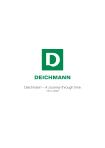It started in 1913 in a blue-collar area of Essen-Borbeck, in the heart of Germany’s Ruhr district. Heinrich Deichmann, born in 1888, opened a cobblers’ shop and ran it with his wife Julie. Two generations and almost a century later, the company has developed into Europe’s market leader. Deichmann is currently active in 36 countries with about 4,700 local shops and employs approximately 49,900 people. Now as always, Deichmann is a family business that believes in growing through its own resources. Stock issues and bank loans are out of the question for Deichmann.
The founding years
Up to 1945, the company was shaped and limited by the politics and economics of the Weimar Republic and the subsequent tyranny of Nazism. The company’s founder, Heinrich Deichmann was against the regime in power. Among other things, he criticized the persecution of his Jewish compatriots, which he experienced at close range. He died in 1940 at the age of only 52. At this point, Heinz-Horst Deichmann, born in 1926, had occasionally been helping in the shop. His mother Julie sustained the shop through the war years. After the war, Heinz-Horst Deichmann studied medicine and theology. On the side, he continued to run the family business together with his mother.
Growth after the war
Heinz-Horst Deichmann received his diploma as a doctor of medicine, but in 1956 he gave up his medical practice to concentrate fully on running the family company. He had already established Deichmann shops in the nearby cities of Düsseldorf and Oberhausen. Deichmann felt responsible for the basic task of supplying the population with good, inexpensive shoes. This is still one of the company’s goals. In 1974, he opened the 100th shop, in Würzburg. At almost the same time, the company went international: In Switzerland, Deichmann acquired the tradition-rich Dosenbach shoe chain. Soon thereafter, Dr. Heinz-Horst Deichmann became active in a completely different realm. In India, he started the Christian aid project wortundtat (Word and Deed), whose initial main activity was caring for those suffering from leprosy.
The third generation steps up
Heinrich Deichmann, born in 1962 and grandson of the company founder, came into the company in 1989. In 1999 he became head of the management board. Today he is the board chairman of Deichmann SE. Under his leadership, the company’s internationalisation has moved ahead. The company purchases shoes in 40 countries. At the sales end, it has more than 4,700 local shops in 36 countries. Besides business development, the company continues its social commitment to people in need, in Germany, Europe, India and Tanzania.
Deichmann 1913 - 2024
